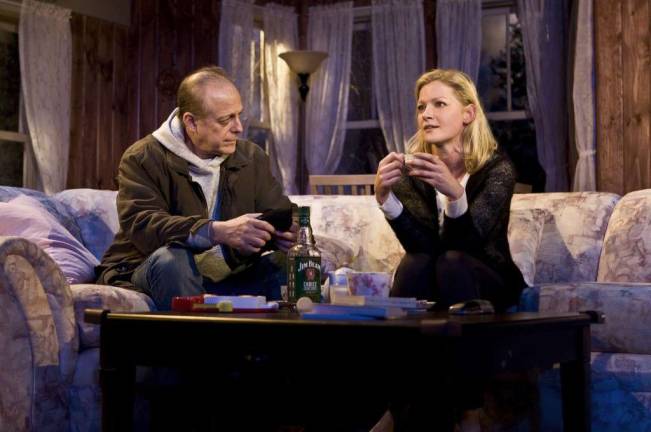Adults Acting Out: A Murky 'Mother' Leaves Many Unanswered Questions

There is a difference between complicated and convoluted, though it can be tricky to adhere more toward the former than the trappings of the latter. One merely involves the involvement of multiple entities occurring beneath the surface at the same time, some of which having a direct effect on others. The other throws these variables into a pot and fills it to the point of disbelief. That's what happens in Francine Volpe's new play, The Good Mother, which is unfortunate, because it is a realistic play that very well could have been an engrossing character study. Mother, directed by Scott Elliott, is the first show of the season for The New Group, one of Off-Broadway's hottest magnets for intriguing playwrights and high-voltage actors. And it certainly has a talented Hollywood lead in Gretchen Mol (The Notorious Bettie Page, "Boardwalk Empire"). She plays Larissa, a 33-year-old Mount Vernon, N.Y., mother to a four-year-old autistic daughter, Allyson. Getting ready for a night out with a truck driver she met the night before, Larissa has asked Angus (Eric Nelsen), the goth-like son of her own high school counselor, to watch her daughter, and talks a blue streak in front of her babysitter while primping for her date. After an odd exchange in which Larissa and her date, Jonathan (Darren Goldstein), return to the house and insist that Angus not leave without a coat, since it has gotten chilly, the play starts to liquefy. Jonathan insists that he has seen Angus sticking around the house and peeping in on them. The next day, Larissa accuses him of doing something to Allyson, though it is never specified what, or if an incident really occurred. Larissa maintains to Angus' father, Joel (Mark Blum), that Allyson has non-verbally communicated something, and from this point on Mother becomes very murky, and raises more questions than it feels necessary to answer. Did Angus ? who, quite believably in Nelsen's smart, measured performance, demonstrated a temper when antagonized by Larissa ? really do something to Allyson? Is Larissa merely being manipulative, and if so to whom, and for what gain? And is she even aware of her machinations? Mother consists of a series of a half dozen scenes with Larissa interacting with the other men in her orbit (Alfredo Narciso, as a teenage friend who also stayed in Mount Vernon, rounds out the group), and the best-constructed scene is one of the central ones, in which Joel confronts Larissa. But that scene, exquisitely acted as it is, raises more questions. Joel, a recovering alcoholic, has been accused of having an affair with one of his young patients (Blum's expert portrayal of a man unraveling within the scene is a brief master class in character work). Can his denial be believed? Did he have an inappropriate relationship with Larissa, who Volpe describes as a troubled teen without elucidating much on the subject? And is that the cause of Larissa's current claims? Those are the substantive questions raised by Mother. But there are stylistic ones, too. Elliott has directed the play with a muted sensibility. The performers often speak in hushed tones, and not all dialogue can be heard. Lighting designer Jason Lyons dims the lights to commemorate the end of each two-hander scene, lending a kind of sleepy haze to a show as it should escalate in intensity. Costume designer Cynthia Rowley's costumes and Derek McClane's set do, however, evoke the notion of lower-class suburban struggle that Volpe's characters traffic in. However, knowing so little about both Larissa and a never-seen Allyson lends little credence to Larissa's motivations and makes her character far too much of an enigma. It is to Mol's credit that she is able to imbue as much sympathy as she does for the plight of a struggling single mother. Goldstein and Narciso are also top-notch, though their roles are little more than serviceable puzzle pieces in the overall Larissa quagmire. In a play that is almost all tell and no show to begin with, having much of the provided exposition feel unreliable is quite frustrating. There is neither a dramatic payoff nor a sense of humane understanding. A show that offers so little insight into both a character's past and present leaves for it a questionable future. The Good Mother Acorn Theater at Theater Row, 410 West 42nd Street. Through Dec. 22. http://www.thenewgroup.org/season1.htm